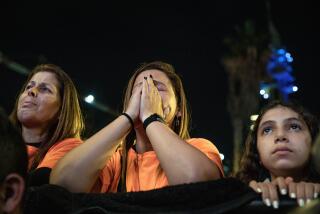In disaster’s wake
- Share via
In the aftermath of a life-threatening catastrophe, some people are desperate to talk, others prefer to digest the experience in private. Reactions to a crisis vary widely from person to person -- and it’s this variation that lies at the heart of a growing controversy over crisis counseling.
In a report to be published in November, a trio of researchers reviewed three decades of studies on “debriefing,” the most common type of psychological intervention therapy after a disaster such as an earthquake or terrorist attack. In a typical session, a therapist meets with a group of survivors, prompts them to talk about their experiences and informs them that some physical symptoms -- sleeplessness, loss of concentration -- are normal. The counseling is thought to reduce the risk of post-traumatic stress disorder, or PTSD, in which such symptoms become chronic.
But the reviewers came to a different conclusion. “There’s no convincing evidence that debriefing works to prevent PTSD, and some [evidence] that it could impede natural recovery” in some people, said Richard McNally, a Harvard University psychologist.
McNally co-wrote the paper, which will appear in the journal Psychological Science in the Public Interest, with psychologists Richard Bryant of the University of New South Wales in Sydney, Australia, and Anke Ehlers of King’s College in London. He said some people would rather not talk about a horrific experience, and doing so may only intensify their horror.
Psychiatrists who provide emergency support to trauma victims say the evidence on debriefing is mixed because post-crisis psychology is difficult to study with any precision. For one thing, different crisis counseling programs use different techniques; there is no single template for offering support in an emergency, and many in the field have moved away from one-size-fits-all debriefings in favor of more individualized counseling. For another, the people who receive counseling are usually grateful someone cared enough to help them, and that in itself could produce a beneficial effect.
“In the past, we figured if you weren’t physically harmed in an event, you were fine, and we did nothing,” said Dr. C. Scott Saunders, director of UCLA’s trauma psychiatry service. “Now we go in, we help people deal with the immediacy of the situation -- contact their loved ones, whatever is needed -- and part of that is allowing the individual who might have been psychologically harmed to talk, and to listen to them. Now maybe that amounts to no more than being a nice guy, but what’s wrong with that?”
The risk of developing PTSD ranges from less than 1% to as high as 30%, depending on proximity to a disaster and direct personal loss, experts say.
In 1999, researchers reported that 42 medical service personnel who got psychological debriefing after having worked during the 1992 Los Angeles riots showed significantly fewer PTSD symptoms than 23 of their colleagues, who had not gotten the counseling. But the workers were not randomly assigned either to receive treatment or not receive treatment, McNally said. Several studies, among victims of car accidents, crimes and other traumas, found that people got no benefit from the counseling; two of the studies suggest that debriefing may impede natural recovery.
In their review, McNally, Bryant and Ehlers recommend that survivors of a crisis not be compelled to talk about it right away, if they’re reluctant. They recommend that counseling be made available a month or so after the event, to those who feel they need it.
“If people are experiencing PTSD symptoms, which have not declined over time, they’ll know it.... We should make psychological services available and not force them on anyone,” said McNally.






